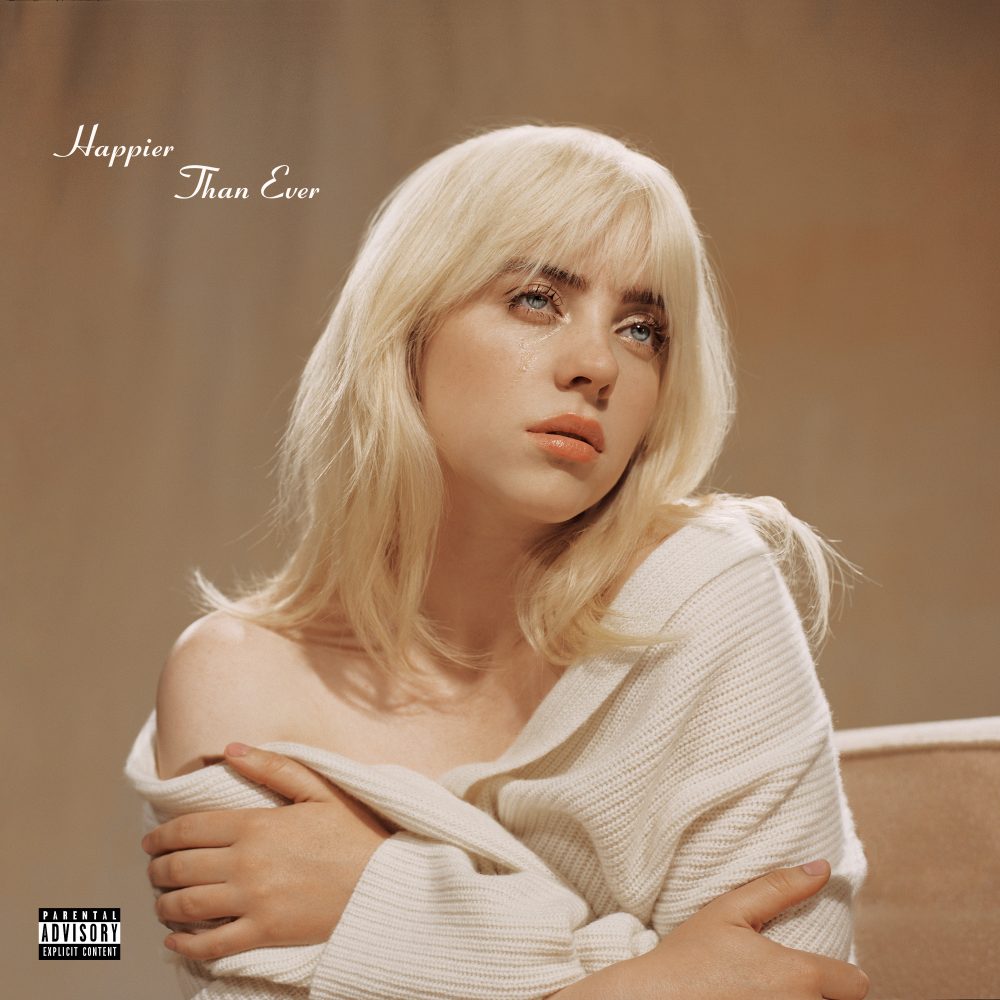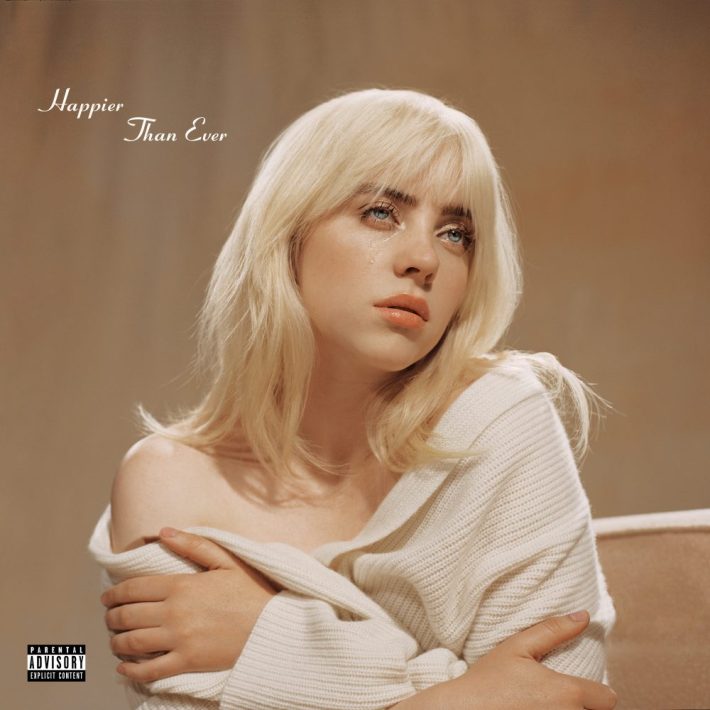- Darkroom/Interscope
- 2021
I wouldn't wish Billie Eilish's success on my worst enemy. There's a stage of fame that, at least to an outsider, looks fun and exciting. You're young and rich, and everyone is happy to see you every time you go anywhere. There's also a stage of fame where your accomplishments become their own prison, where you're constantly awash in the opinions of strangers. That stage doesn't look like any fun at all. Billie Eilish basically proceeded directly to the second stage without passing go. She was a star before she was old enough to drive. Within a couple of years, she was famous enough that she couldn't go outside. Last year, a Billie Eilish impersonator was out there getting mobbed. (On Instagram, Eilish told her impersonators to stop: "You make me look bad… Also soooo disrespectful that you'd go out pretending to be me wearing THIS.")
It would be one thing if Billie Eilish were merely a youth-culture phenomenon. She's not. The grown-ups had to get in on it, too. A month after she turned 18, the Grammys dropped a heaping pile of statues into Eilish's lap. In 2020, Eilish swept the Grammys, becoming only the second artist to win all four major cross-genre categories. (The first, Christopher Cross, won his awards two decades before Eilish was born, and his post-Grammys career does not exactly offer Eilish a reliable roadmap.) This year, the Grammys couldn't stop themselves from continuing to award Eilish, and she seemed actively embarrassed when she took home Record Of The Year for the second year running.
Eilish won that second Record Of The Year for "Everything I Wanted," the first single she released after coming out with her 2019 debut album When We All Fall Asleep, Where Do We Go. "Everything I Wanted" was specifically about Eilish's discomfort with all the attention she was getting; getting that Grammy must've felt like a bitter sort of irony. The song doesn't appear on Eilish's brand-new sophomore album Happier Than Ever, but it does provide a sort of blueprint for the album. When Eilish's first LP blew up the way it did, it took away any possibility that she could ever make an album like that again. Instead, Happier Than Ever was fated to be a reactive record, an album about one young woman's attempts to navigate levels of scrutiny that nobody, least of all a teenager, should ever be expected to handle.
The mere fact that Happier Than Ever exists in its current form stands as some kind of triumph. Eilish's sophomore album was a too-big-to-fail endeavor before it even existed. She must've faced tremendous pressure to make a relatively conventional pop record now that she's a relatively conventional pop star. Instead, she went back to the bedroom-pop process of her first record, making the entire thing with her brother Finneas -- himself a minor alt-rock star now -- co-writing and producing and playing just about everything. But where Eilish and Finneas once sounded giddy and sloppy and inventive and sometimes intentionally off-putting, they mostly come off shell-shocked now. How could they not?
I take no pleasure in reporting that Happier Than Ever is a boring record. The tempos are slow. The arrangements are restrained. The songs are torchy and soft and nervous. Eilish sings so quietly, and Finneas mics her so closely, that you can hear the spit-bubbles popping in her mouth. Happier Than Ever is full of acoustic guitars and delicately deployed synths and hushed, murmuring beats. If this album came from anyone else, it would sound like the kind of downtempo sophisti-pop that used to get played in upscale clothing boutiques in the late '90s. Most of the little details that made When We All Fall Asleep Where Do We Go were small and vaguely discomfiting. They were things like the dentist-drill sound on "Bury A Friend." Those things are gone now. Happier Than Ever is mostly only an interesting album because it's a Billie Eilish album and because Billie Eilish is interesting.
And Billie Eilish is interesting. In the first few bars of her new album, Eilish finds compelling ways to describe the familiar story of the celebrity who's a little taken aback by her own celebrity: "I'm getting older, I think I'm aging well/ I wish someone had told me I'd be doing this by myself/ There's reasons that I'm thankful, there's a lot I'm grateful for/ But it's different when a stranger's always waiting at your door." On the chorus, she sounds the lament of everyone who's ever been lucky enough to learn that a dream job is still a job: "Things I once enjoyed just keep me employed now." (I feel that. I'm sitting here on a Friday afternoon reviewing this dang Billie Eilish record.)
Halfway into Happier Than Ever, we get "Not My Responsibility," a portentous and pretentious spoken-word dirge about how weird it is to have people commenting on her appearance all the time: "Some people hate what I wear. Some people praise it. Some people use it to shame others. Some people use it to shame me." In a lot of ways, it's great that Eilish is able to say these things, that she has a forum to say them. If Britney Spears had been able to say some shit like that in 2001, maybe she'd be in a better situation now. Maybe we all would. But none of that stops Happier Than Ever from becoming a real drag as a listening experience.
It's all so quiet and halting. Much of Eilish's album tells the story of getting over a bad breakup while becoming hugely famous, and the two experiences seem intertwined. Eilish is heartbroken, and part of that heartbreak seems to be the hassle of being way too famous. On "NDA," that sadness comes off almost as eyeroll-inducing tedium: "30 Under 30 for another year/ I can barely go outside, I think I hate it herе/ Maybе I should think about a new career somewhere in Kaua'i where I can disappear." Billie Eilish is a 19-year-old multi-millionaire who is already talking about retiring to go clean Airbnbs or something. (Real estate rental and leasing is the main industry in Kaua'i. I Googled.) That's sad!
In a way, though, "NDA" is one of the few moments where Happier Than Ever really crackles to life. Over a quiet little thump, Eilish half-raps, "I bought a secret house when I was 17," and then she talks about inviting "a pretty boy" over before kicking him out and making him sign a non-disclosure agreement. In both the soft percolation of the music and Eilish's own delivery, "NDA" has a playfulness that's mostly lacking on the album. Elsewhere, the strobing synth-jitters of "Oxytocin" come off like adult-contempo Crystal Castles. "Therefore I Am," the biggest and best of the pre-album singles, has a nice sort of restrained theater-kid energy.
For my money, though, there's only one real moment of greatness on the whole album. In the second half of the title track, I hear a little piece of what Happier Than Ever could've been. The song starts out as a lilting ukulele ballad about the breakup blues, but after a couple of minutes, a distorted guitar comes in, and Eilish starts to yell accusations: "I don't relate to you, no/ 'Cause I'd never treat me this shitty!/ You made me hate this city!" It's the first and only time that Eilish lets her voice get loud, and the sudden endorphin rush of catharsis throws the rest of the record into sharp relief.
Billie Eilish doesn't really do genres. She's made that clear. I'm not going to complain that she didn't make a straight-up rock record, though god knows she could if she wanted to. But there's an energy and commitment in the second half of "Happier Than Ever" that I don't hear in the rest of the album. That energy could've gone into any genre, or any combination of genres, as it did on Eilish's first album. Instead, this time around, it's just gone. I miss it. Despite all her success -- or more accurately, because of her success -- Billie Eilish has a lot of reasons to get mad right now. Except for that one half of one song, she never gives in and lets it happen on this record.
It's impossible not to feel empathy for Billie Eilish. Her timing was too good. In the blink of an eye, her whole musical project went from a bedroom-borne SoundCloud fuckaround to the kind of thing that gets people elevated to unwanted and unsustainable voice-of-a-generation pressure. Maybe Happier Than Ever is her attempt to negotiate and alleviate that pressure. I hope it works. I also hope her next album isn't an hour-long snoozefest.
Happier Than Ever is out now on Darkroom/Interscope.







